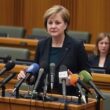Germany’s governing coalition has reached a consensus on core principles for social welfare reform, according to statements released Wednesday evening Chancellor Friedrich Merz emphasized the commitment to maintaining the existing social safety net, stating the intention is to preserve its essential functions rather than implement cuts, while simultaneously acknowledging the need for fiscal responsibility
Federal Minister of Labour and Social Affairs, Bärbel Bas, confirmed the acknowledgement of necessary reforms within the coalition, but cautioned against the perception of impending benefit reductions She highlighted the vulnerability of citizens, emphasizing that unforeseen circumstances such as illness, accidents, or job loss can necessitate reliance on social security provisions Bas advocated for expansion of the labour market as a key means of achieving savings, suggesting that bringing an additional 100,000 people into employment could generate savings of one to two billion euros She also indicated a willingness to strengthen participation requirements for recipients of citizen’s income Whether the coalition can achieve the five billion euro savings target proposed by Chancellor Merz, she stated, will depend on broader economic performance
The Chancellor announced plans to convene a dialogue at the International Automobile Exhibition focusing on “Technology of the Future” aiming for a collaborative solution involving manufacturers and suppliers and referencing relevant EU regulations While not explicitly mentioning the proposed EU ban on combustion engine vehicles, intended to contribute to Paris Agreement climate goals, CSU leader Markus Söder elaborated, stating the discussions will cover drive technologies and autonomous driving, with a firm stance against ceding leadership in the automotive industry to China
Söder also championed the accelerated construction of gas-fired power plants, while Merz indicated a monitoring report will assess the need for adjustments to the energy transition strategy, potentially concerning grid expansion and gas plant construction Both affirmed continued commitment to the transition towards renewable energy sources
Finance Minister and SPD leader Lars Klingbeil pointed to budgetary gaps and a prolonged period of economic weakness, noting underinvestment in the past The Chancellor clarified that tax increases were not part of the discussions within the coalition committee





